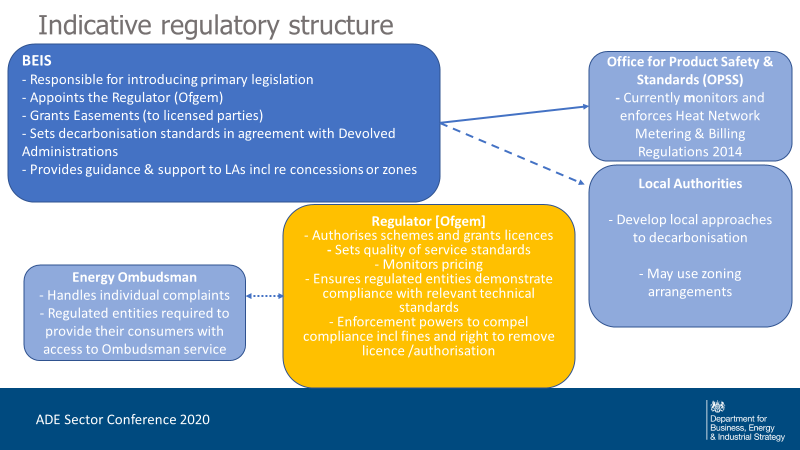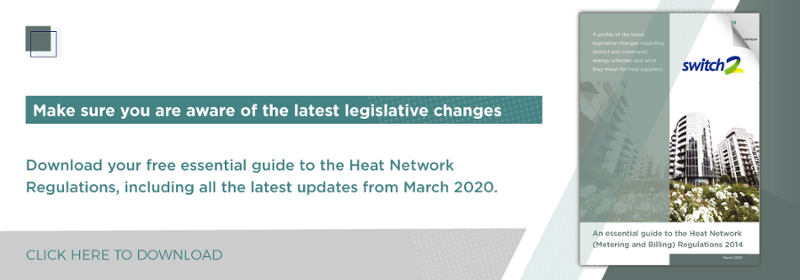The Heat Network Market Framework is the latest proposal which will pave the way to formal regulation of the heat sector. It follows the market study by the Competition and Markets Authority in 2018, where it was found that regulation, further investment and customer protection was needed for this growing area of energy. The Department for Business, Energy and Industrial Strategy (BEIS) published the report in February and 1st June marked the closure of the consultation period.
So, why are BEIS consulting?
BEIS are consulting to address three key areas:
- Supporting the market
- Consumer protection
- Decarbonisation
The introduction of a regulatory framework will be equivalent to other critical infrastructure markets. This will give better structure to the sector, improve performance of heat networks and enable the sector to grow in line with government targets.
The consultation also covers rights and powers and proposes heat networks are granted the same statutory powers as other utilities, for example permits for street works and classifying certain aspects of heat network development as not requiring planning permission.
Consumer protection
The CMA recommended giving heat network consumers equivalent protections to those in the gas and electricity sectors.
Suppliers are encouraged to work to improve their quality of service ahead of regulation, by joining the Heat Trust (the industry led voluntary consumer protection scheme). It is also proposed Ofgem will be the regulators going forward.
Decarbonisation
The Budget on 11th March confirmed the final year of the £320m Heat Network Investment Project (21/22) and also committed to a further £270m of funding for heat networks based around large-heat pumps, waste-heat recovery and solar thermal (this additional funding will be from 2022 to 2025).
To meet the net-zero target the heat network sector will have to grow and decarbonise over the period to 2050.
The Future Homes Standard, to be introduced in 2025, will ensure that new networks supplying new buildings will be run on lower carbon heating.
Heat Networks are a proven and cost-effective method of reducing the carbon intensity of UK heating, but are underexploited, accounting for only 2% of current heat demand. The Committee on Climate Change has estimated that around 18% of the UK’s heat supply could be provided by heat networks if the nation is to achieve its 2050 net zero commitment.
Proposed structure for regulation

Source: BEIS
What are the next steps?
- The consultation closed on 1st June and all responses will be reviewed.
- Government response and further, more detailed consultation
- Detail of regulatory obligations
Switch2’s thoughts on the consultation
Switch2 has submitted its response to the consultation.
Richard Slee, CEO of Switch2 Energy, said: “It is good to see the government investing in the heat network sector and planning regulation that will raise levels of service and performance. The appointment of Ofgem as regulator will make sure that the entire industry adheres to the high standards that organisations like us already voluntarily commit to through The Heat Trust and CIBSE/ADE code of practice.”
Ian Allan, Head of Market Strategy and responsible for Switch2’s response, said: “We are pleased to have been given the opportunity to respond to the Market Framework consultation and feel it is very important for the government to include stakeholders in heat networks in the transition to regulation.
“We support the framework and firmly agree heat networks must be regulated to demand standards and guarantees of service for residents. The appointment of Ofgem to regulate the sector is a sensible one but it is very important Ofgem take the time to work with the industry and fully understand it. The heat network sector is very different in scale and standardisation to the gas and electricity industry. Heat networks are also a natural monopoly.”
“Keeping costs low is essential and Ofgem must deliver a low cost proportional regulatory scheme which works for all involved in the industry, particularly customers.”
“At Switch2 we feel very strongly that all heat networks and therefore customers should be treated the same, regardless of size or other factors. This will bring fairness and consistency to the sector.”



